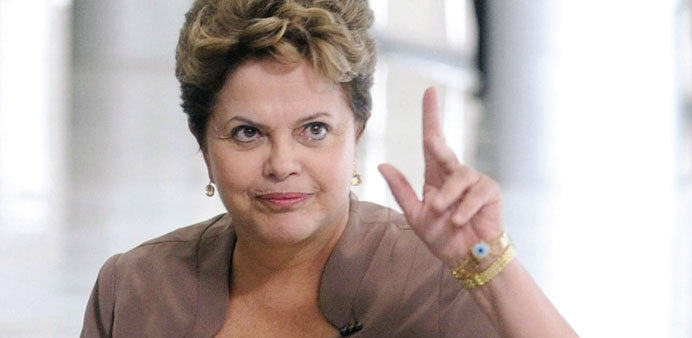Spain’s Banco Santander SA finds itself in an unwanted spotlight in Brazil after its local subsidiary irked the government by circulating a client note saying that the re-election of President Dilma Rousseff would likely push asset prices lower.
In a monthly column to wealthy clients entitled “You and Your Money,” Banco Santander Brasil SA said a drop in Rousseff’s popularity had helped spark a recent rally in the Brazilian stock market - a common view among economists and investors who believe the government’s heavy-handed policies have contributed to Brazil’s current economic slump.
The note then went on to say that the market rally could fizzle if the president’s popularity stabilises or rebounds in opinion polls ahead of October’s election, an assertion that angered government officials and members of the ruling Workers’ Party.
“The real would weaken, long-term interest rate futures would rise again and the Bovespa index would fall, reversing some of the recent gains,” read the column, which was mailed with monthly statements to about 54,000 account holders.
Hours after the report was made public on a local website, the president of the leftist Workers’ Party accused Santander of “electoral terrorism,” sparking a media frenzy that dominated the political pages of Brazilian newspapers over the weekend.
Asked about the episode in an online interview with Brazilian media, Rousseff had harsh words for the bank. “It’s unfortunate and unacceptable what Santander did,” she said, adding that she plans to discuss the matter with the bank.
Santander Brasil is scrambling to contain the damage. It has issued a public apology for using language that it acknowledged could be construed as politically biased.
The bank’s global chairman also weighed in.
Speaking to reporters in Rio de Janeiro, Emilio Botin said the report reflected the views of an individual analyst, not the institution. He also reiterated Santander’s commitment to Brazil, a key market that accounts for a fifth of the bank’s profits globally. “We continue to invest and to encourage others to invest in Brazil,” Botin said, adding that the bank would take the “necessary measures” to ensure that a similar incident does not happen again.
Santander Brasil declined to disclose whether it was conducting an internal investigation into the matter or if people were fired or could be fired over the incident. The Santander incident sent a chill through Brazilian financial markets, prompting some analysts and economists to say they would be extra careful with their research notes to avoid controversy.
Rousseff denies inflation out of control
Brazilian President Dilma Rousseff has denied that inflation was out of control even though it has breached the official target, addressing one of voters’ main complaints ahead of October elections.
Rousseff, who is seeking a second four-year term, downplayed the significance of the 6.52% annual inflation rate registered in June, which broke the central bank’s target limit of 6.5%.
“Inflation is not out of control. It’s at the target ceiling,” the leftist leader said at a candidate’s forum organised by newspaper Folha de Sao Paulo.
“It is currently 0.02 above the target ceiling and is on a downward trajectory.”
Rousseff said that in the 15 years since the central bank set its target band for inflation - 4.5% plus or minus two percentage points - there had been 12 years in which the figure broke the 4.5% target midpoint, including five years in which it broke the 6.5% target ceiling.
She said Brazil had absorbed the blow of the global economic crisis without a major rise in unemployment, which stood at 4.9% in April, the lowest in the country’s history.
“Of the G20 countries, we were one of those that grew the most,” she said. The Brazilian economy has stalled during Rousseff’s presidency, slowing from 7.5% growth in 2010 to 2.5% last year and a forecast of less than one percent this year.
The stagnation, combined with rising prices, has fuelled frustration among voters, though Rousseff remains popular with the millions of Brazilians lifted from poverty under her government and that of her predecessor and mentor, Luiz Inacio Lula da Silva.
She has 38% support ahead of the October 5 first-round election, compared to 22% for her main rival, social democrat Aecio Neves, and 8% for socialist Eduardo Campos, according to a survey last week by polling firm Ibope.

